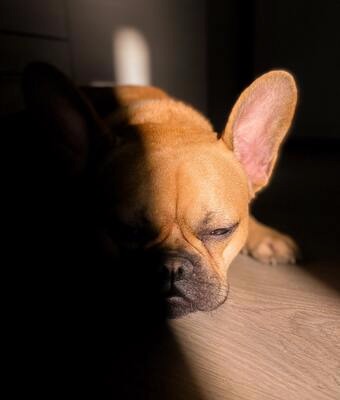
Can Dogs Have Insomnia?
Dogs love to doze, but that doesn’t mean they never experience sleeplessness. Read on to learn more about canine insomnia.

Health & Science
12/28/2022
6 min read
Any pup owner can attest that dogs sometimes seem to do almost nothing but sleep. Dogs certainly tend to slumber as much as possible, but this doesn’t mean they don’t experience periods of sleeplessness and even insomnia. As with humans, some dogs are more prone to the condition than others and it can occasionally pose a serious concern. Unfortunately, this issue is often ignored or mistaken for different health issues because canine cognition still confuses many pet owners.
What is insomnia?
Insomnia is an inability to get sufficient amounts of restorative sleep. It can often result in fragmented sleep and a diminished quality of sleep as the night progresses. It may also exacerbate other sleep problems.
Dogs who are experiencing sleep issues may experience one or more of the following: difficulty initiating sleep, difficulty staying asleep, irregular sleeping patterns, and waking up too early.
The importance of good sleep routines for dogs
At every stage in their life, an appropriate amount of restful sleep is essential for a dog’s health. Puppies, adults, and senior dogs have different requirements, but they all require plenty of Zs to stay happy and healthy. Without sleep, they may exhibit behavioral concerns and develop additional health conditions.

Introducing a dependable sleeping routine should start early in life. Early lessons help ensure dogs learn the appropriate habits and happily stick to the appropriate schedule as they age and grow. Some dogs like sleeping in crates, others prefer snuggling up alongside their owners. Whatever their sleeping arrangements, an owner’s goal should be to ensure a comfortable, safe place for dogs to rest each night.
Your dog’s sleep stages
Dogs go through several different sleep phases during a normal night. Each phase is characterized by a distinct pattern of behaviors, including rest and movement periods.
To humans, these phases may appear to be disjointed and erratic. To dogs, however, they are perfectly aligned with their natural circadian rhythms. Dogs who get enough sleep experience a slow-wave sleep (SWS) phase in the early evening. Those who get too little sleep experience an arousal phase in the early to middle periods of the night.
Dogs also experience a REM (rapid eye movement) phase in the middle of the night. Periods of REM sleep are when dreaming occurs. Once awake, dogs may exhibit tail-wagging and barking behaviors to communicate their excitement and alertness. Experts advise owners not to wake dogs who are whining or softly barking in their sleep. These dogs are probably experiencing REM sleep and may be startled if they’re suddenly shaken awake.
Sleeping disorders in dogs
There are a range of common sleeping disorders that canines may fall victim to – even despite attention and effort.
Narcolepsy
Narcolepsy is a disorder that affects the brain’s ability to regulate the body’s sleep cycle. Dogs can suffer from narcolepsy due to various conditions, including traumatic brain injuries and certain neurological diseases. In many cases, dogs with narcolepsy also struggle with other problems, such as anxiety and depression. These can make the disorder harder to diagnose. For this reason, it is essential to seek medical attention if your dog takes frequent daytime naps, yawns excessively, exhibits muscle weakness, or seems overly tired throughout the day. While not all cases of narcolepsy in dogs require treatment, early detection is important to ensure symptoms are addressed quickly. Keeping your dog’s daily environment clean and stimulating can help minimize this condition’s impact on their quality of life.
Sleep apnea
Sleep apnea is characterized by pauses in breathing during sleep. These pauses can last for a few seconds or as long as a minute or more and occur dozens of times per night. Sleep apnea in dogs is often caused by obstructed airways, as can occur when the soft palate is too long or floppy. This condition can arise due to breed-related anatomical features, obesity, or other conditions that cause inflammation in the airway. Sleep apnea symptoms in dogs include snoring, restless sleep, panting, and daytime drowsiness. Sleep apnea is a potentially severe condition that requires medical intervention.

REM Disorder
REM Disorder is a sleep disorder characterized by a dog’s inability to enter into the REM stage of sleep. Dogs with REM Disorder often make quick eye movements while sleeping, but they will not enter into the deeper stages of sleep. This can lead to problems with daytime energy levels and behavior, as well as increased anxiety levels. There are several possible causes for REM Disorder in dogs, including genetics, stress, anxiety, and medical conditions.
Insomnia in dogs: what and how
Insomnia in dogs can be a big problem. In some cases, it may even be life-threatening. There are several possible causes for Insomnia in dogs, including:
- Anxiety: It’s thought that anxiety may lead to increased production of stress hormones. These make dogs anxious and can reduce their quality of sleep. They can also lead to separation anxiety and depression.
- Medications: Some medications can disrupt sleep patterns in dogs. For example, anti-anxiety medications (such as clomipramine) can cause Insomnia by suppressing normal nighttime cortisol production. Talk to your veterinarian about how any medications your dog is taking or may take in the future could affect their sleep patterns.
- Sleep environment: Dogs who spend a lot of time indoors are more likely to experience sleep problems due to disrupted circadian rhythms. A noisy, cluttered, and uncomfortable sleeping environment can also disrupt a dog’s slumber.
How to treat insomnia in dogs
Treatments for sleep disorders in dogs may include medication, increased exercise, training classes, or behavior modification. In some cases, surgery may be necessary to correct underlying problems. A vet may also suggest sleep schedule or environment adjustments.
Sleep easy with pet insurance from Animalia
A comprehensive dog insurance policy may offer 90% reimbursement on a host of pet care expenses, helping save you countless sleepless nights throughout your dog’s life. Get a quote today.



Get your pet insurance quote
Pet type
- Dog
- Cat
What is your pet's name?
Zip code




